Summer cucumbers are crisp, sweet, and versatile. They’re great in salads, sandwiches, pickles, and even kimchi. Proper storage in the fridge can keep them fresh for up to a week. Follow our tips for choosing and storing cucumbers to avoid mushy, slimy disappointments.
How to Choose Cucumbers

You must know what you want in each fresh veggie to ensure you get the most out of your cucumbers. So, here are a list of dos and don’ts to be mindful of when shopping for cucumbers:
First and foremost, cucumbers should be medium to dark green. This is a good indicator of freshness and quality. Cucumbers that are too pale or have a yellowish hue may need to be fresh.
Next, ensure the cucumbers are firm and free from soft spots, bruised flesh, or wrinkles. These are signs of deterioration and may affect the taste and texture of the cucumber.
They are inspecting the cucumber for any blemishes or white mold. These could indicate that the cucumber is either also essential or overly ripe. You want to avoid cucumbers with these characteristics as they may have a better flavor and could spoil quickly.
Additionally, a fresh cucumber should be odorless. If you notice any strong or unpleasant smells coming from the cucumber, it may be a sign that it is overly ripe and past its prime.
Lastly, picking up a cucumber should not feel puffy or heavy, as though it is full of water. A cucumber that feels excessively heavy may indicate waterlogged and less flavorful.
By keeping these guidelines in mind, you can ensure that you select the freshest and most delicious cucumbers for your meals and snacks.
How to Prep Cucumbers for Storage
According to the Food and Drug Administration (FDA), it is estimated by federal health officials that nearly 48 million individuals fall ill every year due to consuming food that has been contaminated with harmful germs.
To prevent any potential germs or bacteria from affecting the produce, it is recommended that you wash your hands thoroughly before handling cucumbers. To prolong the freshness of the cucumbers, here are some helpful tips for cleaning them once you bring them home.
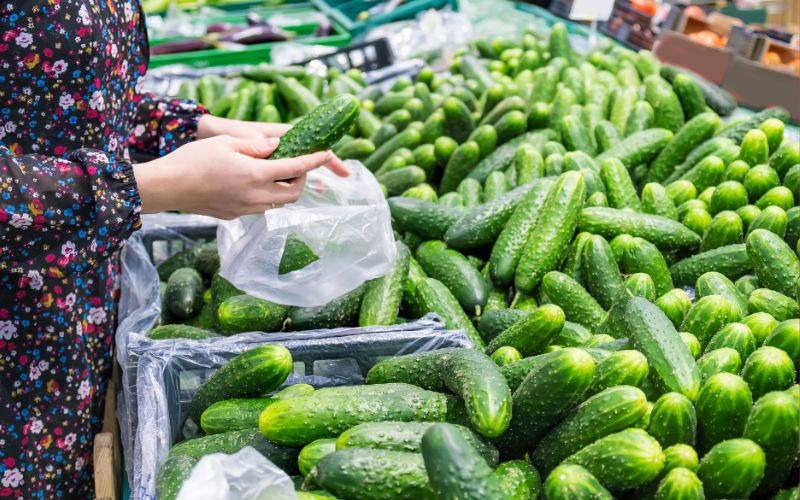
Start gently rubbing the cucumber under plain, cool, running tap water. The FDA emphasizes no need to use soap or a produce wash for this process. If you are dealing with firm produce like melons and cucumbers, it is advisable to scrub them with a clean vegetable brush.
Even if you plan on using the cucumber immediately or on the same day, scrub them with riol water before peeling. This precaution ensures that any dirt or bacteria on the knife is not transferred onto the cucumber’s flesh.
After washing, thoroughly dry the cucumbers using either paper towels or an absorbent, clean kitchen towel before storing them. Storing them while still wet can lead to excess moisture, causing the cucumbers to become slimy and spoil quickly. Taking these steps will help you maintain the freshness and quality of your cucumbers for longer.
Do cucumbers last longer in the fridge or on the counter?
Even though cucumbers are prone to chilling injury, storing them in the fridge is still recommended for optimal freshness. Cucumbers have a short shelf life at room temperature of about two days before deterstoringtoring them in the wis still recommended armest part of the fCucumbersurthest from the cooling at room temperature elements; you can extend their lifespan and ensure they stay crisp and delicious for extended periods.
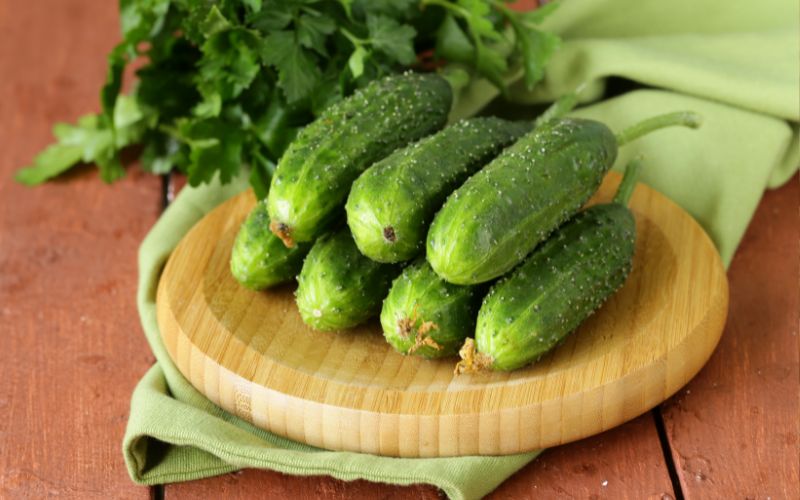
This strategic placement allows them to benefit from the cool temperature of the refrigerator without being exposed to icy conditions that can cause chilling injury. So, next time you bring home a batch of fresh cucumbers, remember to give them a cozy spot in your fridge to keep them at their best!
What is the best way to store cucumbers in the fridge?
To ensure optimal freshness and longevity, it is recommended to carefully remove the cucumbers from any plastic wrapping that might be present, as this can inadvertently expedite the ripening process.
Once this initial step is completed, thoroughly wash the cucumbers to eliminate any potential impurities. Next, gently wrap the cucumbers in soft and absorbent paper towels, which will aid in maintaining their crispness and prevent excess moisture buildup.

Transfer the wrapped cucumbers to a suitable container designed explicitly to preserve their quality for proper storage. Placing the container in the refrigerator’s crisper drawer is advisable to enhance its shelf life further, as this section offers a controlled environment with ideal humidity levels.
Additionally, it is recommended to position the cucumbers towards the front of the refrigerator refrigerators crisper drawer and ensure they remain at a consistently cool temperature. By following these steps diligently, you can prolong the lifespan of your cucumbers and savor their refreshing taste for an extended period.
How to Store Cucumbers So They Stay Crisp
When it comes to keeping cucumbers in the crisp state that we all love them for, it’s essential to understand that the longer they stay whole, the better. Once they’re cut, you’re on a time limit, and preserving their freshness becomes a top priority.
Your first thought likely is to place cucumbers in a crisper drawer, as this is a common practice. And while this is indeed a good idea, there is an even better way to store them to ensure their longevity. One effective method is to wrap the cucumbers in either plastic or beeswax wrap, creating a protective shield that helps prevent moisture loss.
By doing so, you are providing them with an airtight skin. Another option is to place the wrapped cucumbers in an airtight container and store them on a shelf. This method is often used for thin-skinned varieties like English cucumbers, as it helps maintain their freshness for up to a week.
It’s important to note that cucumbers are sensitive to ethylene gas released by other fruits or vegetables nearby. This gas can accelerate the ripening process and ultimately lead to a loss of crispness. Wrapping the cucumbers provides additional protection against this gas, helping preserve their texture and flavor. However, keeping the vents open is recommended to promote proper air circulation if you use the crisper drawer.

For those who prefer the method, consider sealing your wrapped cucumber in a zip bag and storing it in the fridge door. If you don’t have access to plastic wrap, a paper keeping the vents open is recommended. A paper towel will help absorb any excess surface moisture, further contributing to the cucumber’s freshness. It’s worth mentioning that cucumbers thrive in the more relaxed environment of the fridge, but they are still delicate and require gentle handling.
Avoid placing them at the back of the refrigerator, as the extra cold temperatures could freeze them. Similarly, storing them at the bottom of the crisper drawer may result in soft spots or bruising, known as a “chilling injury.” By following these precautions, you can ensure that your cucumbers retain their crispness and remain delicious for an extended period.
If you have a surplus of cucumbers and are concerned about utilizing them before they spoil, consider pickling as a preservation method. The brine used in pickling will enhance their flavor and keep them crisp and delicious for months. This way, you can enjoy the taste of fresh cucumbers long after their peak season.
How do you store too many cucumbers?
Freezing cucumbers is an excellent method for preserving them, ensuring you can savor their deliciousness and enhance their flavor for future use. Consider slicing some, chopping others, or even peeling a few, depending on your culinary preferences. Once prepared, conveniently freeze them in pre-portioned bags or containers, ready whenever needed. Whether you intend to pour them into refreshing salads, adlaterrful smoothies, or use them in various recipes, freezing cucumbers allows you to extend their shelf life and enjoy their crispness and taste whenever desired.
Can you store cucumbers in cold water?
To maintain the optimal freshness and crunchiness of your cucumber slices, it is advisable to place them in a sealable and airtight container, preferably one that can be reused multiple times. Doing so creates a protective barrier that prevents moisture escape while effectively warding off dry air, which can cause your cucumbers to lose their desired texture.
Once securely sealed, fill the container with water, which will further help maintain the desired moisture level. Lastly, store the container in the refrigerator, where the cool temperature will aid in preserving the freshness of your cucumbers until you are ready to enjoy them.
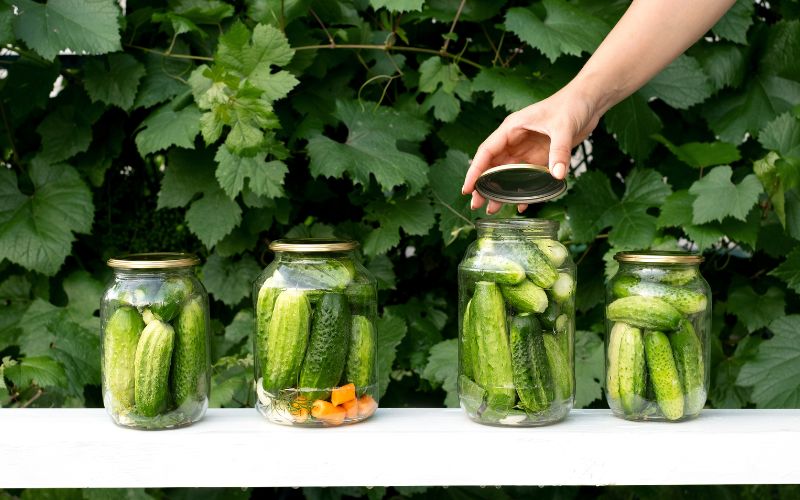
By following these simple steps, you can ensure that your cucumbers remain irresistibly fresh and delightfully crunchy when the time comes for you to maintain the desired moisture level of cucumbers in salt water.
To ensure that the cucumbers remain fully submerged under the brine, it is recommended to weigh the cover with a plastic bag filled with brine or a jar of water. This will help create the necessary pressure to keep the cucumbers in place and prevent them from floating to the top. Before placing the weight on top, cover the surface and sides of the container tightly with plastic wrap to create a proper seal. Additionally, it is essential to eliminate any trapped air underneath the plastic wrap to maintain the optimal conditions for fermentation.
Can you preserve cucumbers without vinegar?
In reality, fermenting is not only an incredibly effective method of preserving foods but also surprisingly simple. All it takes is gathering all the necessary ingredients, placing them carefully into a jar, and allowing the incredible power of bacteria to work its magic.
Fermentation transforms ordinary cucumbers into extraordinary delights, and the best part is that you don’t even need to use vinegar! Instead, these particular cucumbers are made using salt brine, which adds a unique tangy flavor to the final product; however, if you prefer a slightly different taste profile, fear not!
There are countless recipes out there that utilize vinegar brines, offering a whole new range of flavors to explore and enjoy. So why not embark on a culinary adventure and delve into the world of fermented cucumbers today?
How do you preserve cucumbers in a bottle?
If you have a cucumber in a bottle, how long will it last before it goes wrong? While the natural lifespan of a cucumber is only a few days, there is a way to extend its lifespan and continue enjoying the fun it brings.
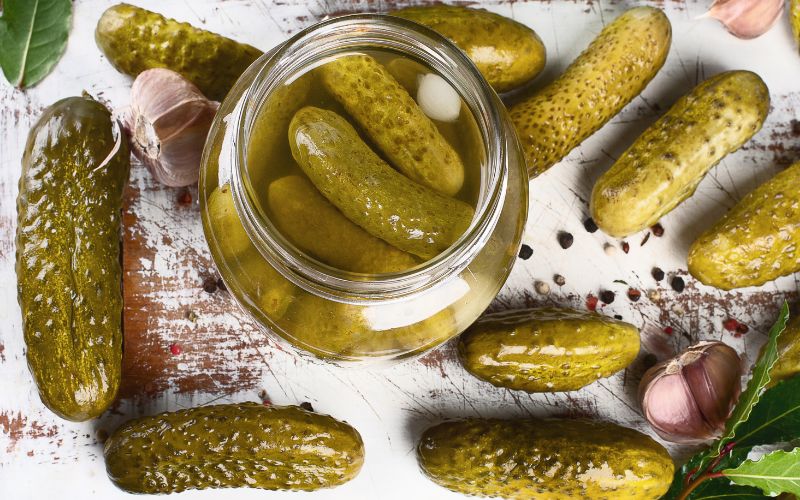
To preserve your cucumber, you can follow a simple process that involves boiling a mixture of vinegar and water, along with some pickling salt. By boiling 2 cups of vinegar mixed with 2 cups of hot water and adding three tablespoons of pickling salt, you create a solution that will help preserve the cucumber and keep it fresh for longer.
Once the mixture has cooled down, you only need to pour it over the cucumber in the bottle and seal the jar shut. This process will not only extend the fun you can have with your cucumber, but it will also ensure that you can enjoy its crispness and flavor for an extended period.
How do you store cucumbers in plastic bags?
Storing refrigerated cucumbers in plastic bags is a great way to ensure they stay fresh and retain their optimal moisture level. By taking a few simple steps, you only need the shelf life of your cucumbers and maintain their quality.
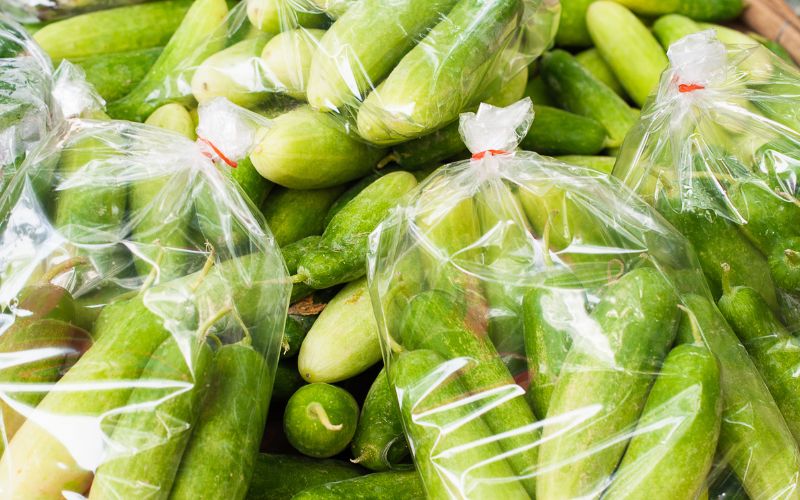
First, cleaning the cucumbers thoroughly and drying them properly is essential. This helps remove any dirt or residue accumulated on the surface. Once they are clean and dry, wrapping each cucumber in a paper towel can provide an extra layer of protection and absorb any excess moisture.
Next, placing the wrapped cucumber inside a plastic bag is essential. The bag is a barrier, preventing the cucumber from being exposed to outside elements that could affect its quality. Cleaning open is best for proper air drying them correctly is essential is resealable. This is crucial in preventing condensation buildup, which could lead to spoilage.
How to Store Sliced Cucumbers
When it comes to storing sliced cucumbers, there are a few key steps to ensure their freshness and crispness for an extended time. Firstly, starting with firm and free cucumbers from blemishes or soft spots is essential. Once your cucumbers are ready, thoroughly wash them under cool running water to remove dirt or debris.
Next, carefully slice the cucumbers to your desired thickness using a sharp knife or mandoline slicer. It is worth noting that thinner slices will typically have a shorter shelf life compared to thicker ones. After slicing, pat the cucumber slices dry with a clean paper towel or a kitchen cloth to remove any excess moisture, which hastens spoilage—firm tions for cucumbers storing your sliced cucumbers: refrigeration or pickling.
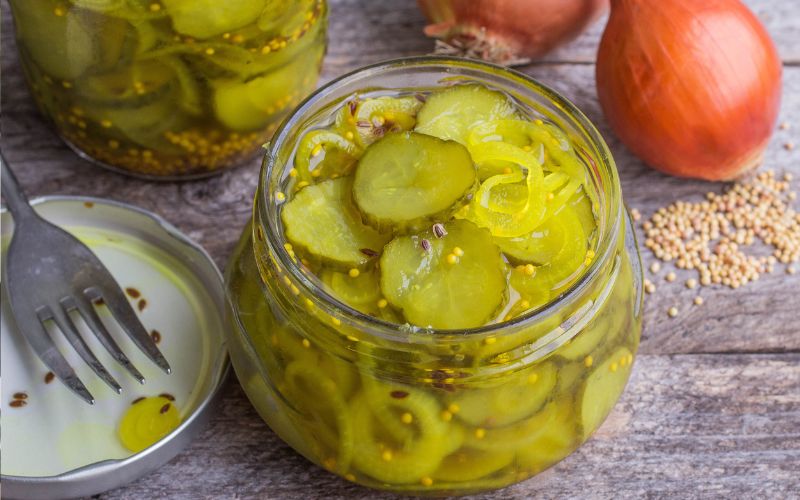
Suppose you prefethoroughly wash the slices into an airtight container or resealable plastic pieces with paper towels or cloth napkins to absorb using a sharp knife or mandoline slicer residual moisture and prevent them from becoming soggy. Seal the container or bag tightly and place it in the refrigerator’s crisper drawer, where the temperature is more relaxed and consistent.
This will help maintain the cucumbers’ crunchiness and prevent them from wilting. For optimal taste and texture within a few days, remember to consume the refrigerated sliced cucumbers. On the other hand, if you pickle your cucumber slices, you can prepare a brine solution consisting of water, vinegar, salt, and any desired herbs or spices. Submerge the cucumber slices in the brine solution in a clean glass jar or airtight container, ensuring they are covered entirely.
Seal the jar tightly and store it in the refrigerator for at least 24 hours to allow the flavors to meld together. Pickled cucumber slices can last several weeks. For optimal taste and texture, remember appropriately in the fridge whether you refrigerate or always remember to check for spoilage before consuming them. To prepare sliminess or an off-putting odor. If any of these are present, it is best to discard the cucumbers to avoid any potential foodborne illnesses.
How to Freeze Cucumbers
When it comes to freezing cucumbers, you can choose whether to peel them or leave the skin on. Either way, it is recommended to slice them before freezing. To begin, arrange the cucumber slices in a neat row on a baking sheet lined with parchment paper, ensuring they are evenly spaced.
Place the baking sheet in the freezer and allow the cucumbers to freeze completely. Once frozen, you can transfer the slices to a zip-top bag or a safe container for freezing. Remember that cucumbers may expand during freezing, so it is advisable not to pack them too tightly in a bag or container.
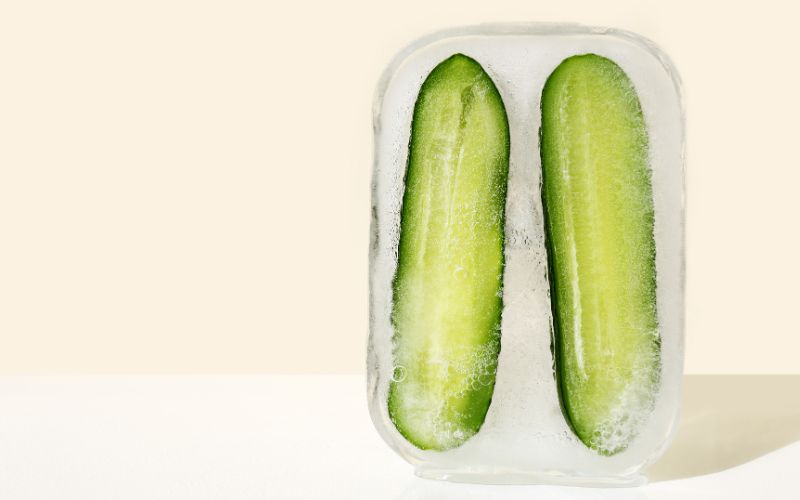
Now, let’s delve into the fascinating world of amazing cucumber salads from around the globe. Cucumbers are known for their high water content, which accounts for an impressive 96% of their composition. This characteristic not only makes them ideal for freezing but also means that they may become slightly mushy when thawed.
When it comes to using thawed frozen cucumbers, they are best suited for specific culinary applications. For instance, they can be used in smoothies or incorporated into refreshing beverages.
Additionally, they can be a delightful addition to chilled soups like gazpacho. However, it is essential to note that freezing cucumbers will inevitably alter their texture and taste upon thawing. Therefore, it is recommended to consider these factors when deciding how to utilize thawed frozen cucumbers in your recipes.
Airflow vs. Airtight Cucumber Storage
After carefully washing, thoroughly drying, and meticulously wrapping up their cucumbers, individuals often opt for the seemingly foolproof method of storing them in an airtight zip-top bag or container to safeguard these beloved green gems.
Alas, unbeknownst to many, this seemingly well-intentioned approach inadvertently traps moisture within, creating an environment that could be better for cucumbers. Cucumbers have a unique affinity for staying dry and yearning for fresh air.
When confined within an airtight container, they are swiftly exposed to the perils of condensation, leading to an untimely demise that could have been avoided. Fear not, for we have a solution!
To ensure the longevity of your cucumbers, it is recommended that you store them in a state of pristine dryness, snugly wrapped, and nestled within a to safeguard permits just the right amount of airflow. By allowing gentle air circulation, you will give your cucumbers the gift of crispness, dryness, and freshness, thus extending their lifespan for longer.

